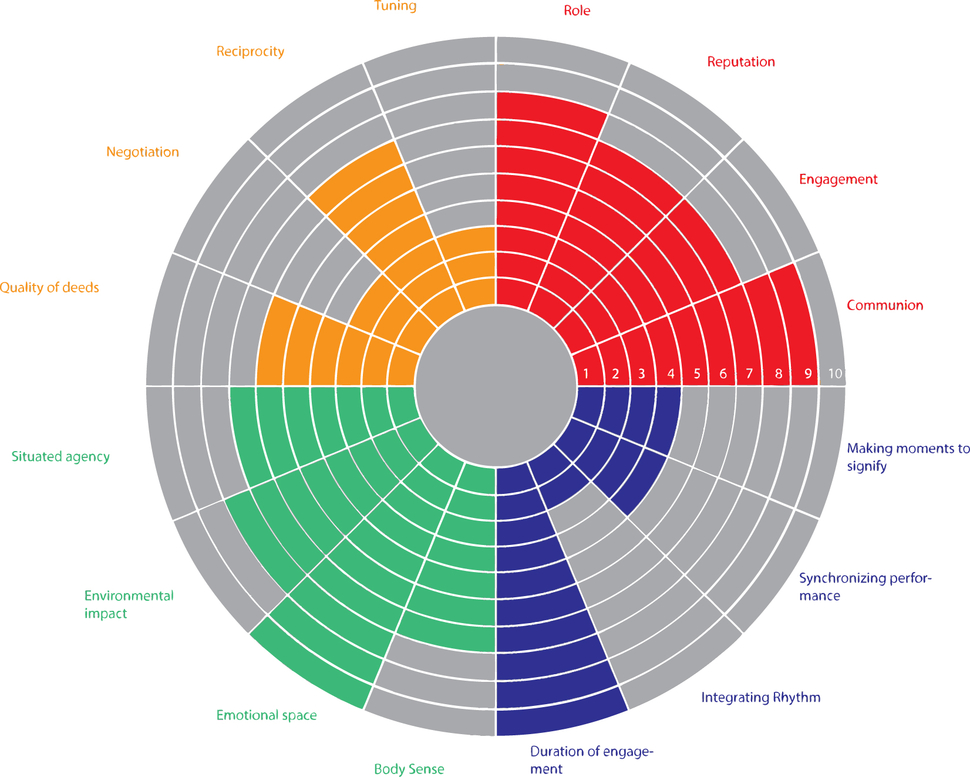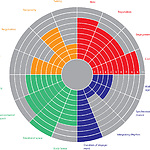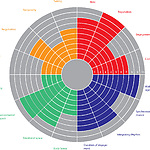2.2. Description of current daily life regarding accommodation.
The next step is to describe the needs, mechanism and details of the functioning of the accommodation in Texel. To do this, the aforementioned YUTPA analysis is used on two types of accommodation and two timeframes. This chapter will describe the YUTPA analyses for the present. The first type is private accommodation, housing the local islanders, of which most work in the tourism industry. The second type is the tourism accommodation, representing a large part of the industry of the island. By doing these analyses, the daily life in connection with the accommodation on the island becomes clear for both tourists and locals and will lead to a future plan.
Private accommodation
For the private accommodation (permanent and summer houses) the owner’s role is crucial since he is the one taking all the decisions and making all the changes. Therefore, a local homeowner is chosen as the center of this YUTPA analysis. Maintaining his place and keeping all of his property (state and garden) in a good condition, contributes a lot to his reputation which is important in the small Texel’s community. It is up to him, whether he will spend time and effort on his place and what kind of solutions he is going to adopt. In such a small and close community, though, the interaction between neighbors are high, since they share the feeling of fellowship, as a result of sharing common attitudes, interests and lifestyles almost daily.
The time dimension has an overall lower impact. Making moments to signify is all about lifetime events and their locations. For people living in Texel, their living spaces are also part of their memories and they are feeling deeply attached to them. Of course every family has its own integrated rhythm on a small scale. People show a rhtyhm for eating, sleeping and going to work, but this rhythm almost disappears on a bigger scale. Rhythm might appear daily, but not monthly and rhythm might appear within a family, but not within a street community.
Generally, the living environment influences, both physically and emotionally, the dwellers. People living in Texel are surely emotionally attached to their place, considering their houses their own closed environment and comfort zone. That’s the reason why they should be better aware of the environmental impact their places have to the island in general; how much waste do they produce or the energy the consume. After all, their actions, their personal involvement and the way they treat their house may minimize their environmental footprint by far.
When we are talking about private property, each owner or family has its own rules. If the homeowner wants to make changes to his home, he is able to do so. This means he has a high quality of deeds and reciprocity. Nevertheless, though, there are some non-negotiable restrictions like laws or community regulations that they have to follow. Therefore, to convince the inhabitants of Texel to make changes in their houses means that they should also be convinced that their living environment will get better and their daily life will be improved. Though, even if only one person of each family decide to change its lifestyle towards more sustainable solutions it can also influence the whole family since people tend to imitate other behaviors especially when they share the same roof.
YUTPA Analysis of a homeowner (present)
Tourist accommodation
Since tourism is one of the main sectors providing income to the local community of Texel by attracting a considerable high number of people each year, its role is of a high importance and it cannot be neglected. The overall facilities, not only the hotels and the camping places but the entire infrastructure essential for tourism (transport and traffic system, land use etc.), form and affect the built environment of the island. Moreover, the reviews it receives from people visiting the island and its reputation is considered of great significance since it’s likely to have a profound effect on success, survival and well-being not only for the specific sector but the whole community. It can easily be understood, though, that the owner of a touristic accommodation is more engaged to its property than the tourists that may visit it for a couple of days. Nevertheless, facts and numbers show that, a high percentage of the people visiting the island, re-choose it as a destination. For this reason the second YUTPA analysis will have a tourist as the main topic.
Because a lot of tourists revisit Texel, a that a closer relationship is being developed between tourists and the local community, even though tourist aren’t present on the island for a large part of the year. This means the role and community of the tourist is fairly high, while the engagement stays low.
While being on vacations most people want to make memories that last. Accommodation that actually fulfill their expectations and give them the feeling that they make the most out of it, contributes to that direction. At the same time, each group of visitors (family, friends, organized tourist group etc.) has its own program. Still, there are specific things that people do during their vacations and behaviors they adopt, especially when they repeatedly visit a place like Texel. That’s the reason why a high rate of the people visiting Texel feel engaged to it and will willingly contribute to some of the proposed changes, no matter if they are staying there only for a few days.
The place that tourists choose to spend their vacations at, not only the island itself, but more specifically the accommodation they are staying in, is of an average importance because it can influence them (both physically and emotionally). Moreover, talking about tourist accommodation particularly, we cannot disregard its environmental impact and especially the seasonal ups and downs on the energy consumption and the waste production. Of course, the only one who has the authority of changing the facilities is the owner; tourists can express their opinion or make comments and remarks but after all it’s up to him. Nevertheless, though, if their opinion is heard it can also affect their behavior towards the accommodation (come back again, make good comments-influence reputation, suggest the place to other people etc.)
Being a tourist also means that you won’t care that much for improving the place around you; those visiting Texel prefer to find everything fixed and in order and put the less effort they can for a temporary place that they are staying in. Still, since this type of accommodation (hotels and camping sites) is a business after all, both the clients and the owners are waiting something from it: clients to get the best out of the money they are willing to spend and the owner to have the biggest profit out of his business. If the tourist isn’t happy with his or her accommodation, it can leave a bad review, which has a big impact on the accommodation owner. Therefor, tourist score high on negotiating. These reviews affect other tourist, leading to groups of people choosing the same type of accommodation (hotels or camping places). Overall this means tourist also score fairly high in tuning.
YUTPA Analysis of a tourist (present)


